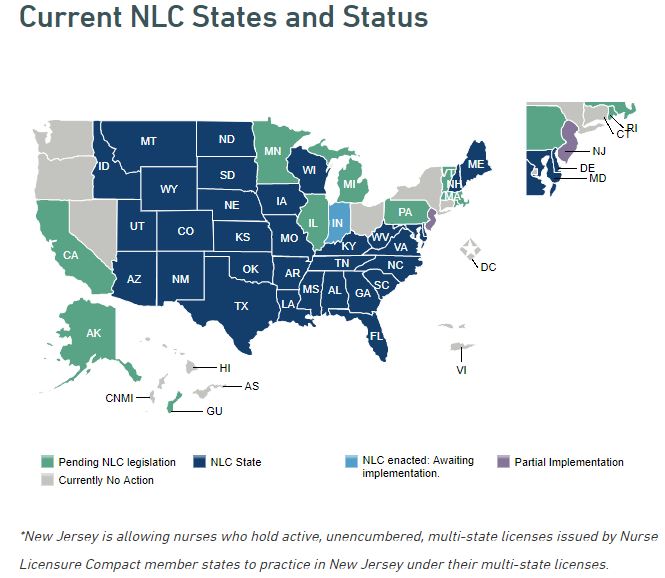Minnesota should join the national Nurse Licensure Compact
A couple of weeks back, I wrote about how, to fight the Coronavirus, Gov. Walz should allow healthcare workers licensed in other states to work in Minnesota. As Colorado has just done, we should allow medical professionals licensed in other states to start practicing here immediately. While this is a no-brainer now, it is good policy going frwards. As I wrote previously, “even when this crisis passes we should allow nurses and other healthcare workers to work in our state as long as they are licensed in their home states.”
What is the Nurse Licensure Compact?
One way to do this would be for Minnesota to join the national Nurse Licensure Compact. As the Minnesota Board of Nursing (MBN) describes it:
The Nurse Licensure Compact (NLC) allows a nurse (RN and LPN/VN) to have one compact license in the nurse’s primary state of residence (the home state) with authority to practice in person or via telehealth in other compact states (remote states). The nurse must follow the nurse practice act of each state. The mission of the Nurse Licensure Compact is: The Nurse Licensure Compact advances public protection and access to care through the mutual recognition of one state-based license that is enforced locally and recognized nationally.
Currently 34 states are members of the compact.

Why isn’t Minnesota in the compact?
Clearly, Minnesota should be a member of the compact. Why aren’t we?
Well, it isn’t because the nurses are opposed. The MBN says:
Nurses frequently contact the Board of Nursing questioning when Minnesota will join the Nurse Licensure Compact. To address these queries, the Minnesota Board of Nursing (MBN), in collaboration with the National Council of State Boards of Nursing (NCSBN), conducted a web survey of all registered nurses (RNs) and licensed practical nurses (LPNs) with an active license in Minnesota to assess nurses’ knowledge of and opinions about the NLC. The survey was comprised of 12 questions and was sent in February 2017, to 122,973 nurses of which 20,834 responded.Overall, more than 80% of respondents to the survey were in favor of Minnesota joining the NLC.
If the nurses are for it, who is against it? The unions. A fact sheet put out by the Minnesota Nurses Association (MNA) in 2015 says:
The Compact is a direct threat to MNA as a professional association and sole collective bargaining agent for nurses in MN. No other large healthcare/labor states have allowed adoption of this Compact
But this is false. The MBN has the power to waive the licensing requirement for any shortage including one created by a strike.
As my colleague Tom Steward explained back in 2016:
The Catch-22 particularly affects nurses in border communities, telemedicine and the traveling nurse program.
“Nurses in Minnesota are at a disadvantage because they cannot practice in the surrounding states without buying a second, third or fourth license,” said Rep. Kim Norton, DFL-Rochester. “…We have a border state agreement, but it does not extend to our nurses and their state, just those coming into our state.”
In 2012, the Minnesota House and Senate passed a bipartisan bill paving the way for the state to join the compact, but the measure stalled in conference committee, following intensive lobbying by MNA.
Previously, I asked: “Do we think that other states are so slipshod in their licensing practices that they are rife with unsafe practitioners who would pose a threat to Minnesotans?” But public safety is not the issue here. The real issue is the desire of the MNA to protect its privileged position. This goes against the desires of the nurses themselves and against the public interest. Minnesota should join the compact.
John Phelan is an economist at the Center of the American Experiment.